How Long Does It Take to Pressure Wash a Driveway?
Introduction
Pressure washing has become an essential maintenance practice for homeowners looking to preserve the cleanliness and longevity of their driveways. Understanding the time required for this task is crucial for planning and executing it effectively.
Understanding the Importance of Pressure Washing
Pressure washing isn’t just about aesthetics; it’s about safeguarding the structural integrity of your driveway. Over time, driveways accumulate dirt, grime, oil stains, and even mold, which not only diminish their visual appeal but also pose potential hazards and accelerate wear and tear.
Overview of Pressure Washing Driveways
Pressure washing involves using high-pressure water spray to remove stubborn stains, dirt, and contaminants from various surfaces, including concrete, asphalt, brick, and pavers. It’s a versatile and efficient method for restoring the pristine condition of driveways.
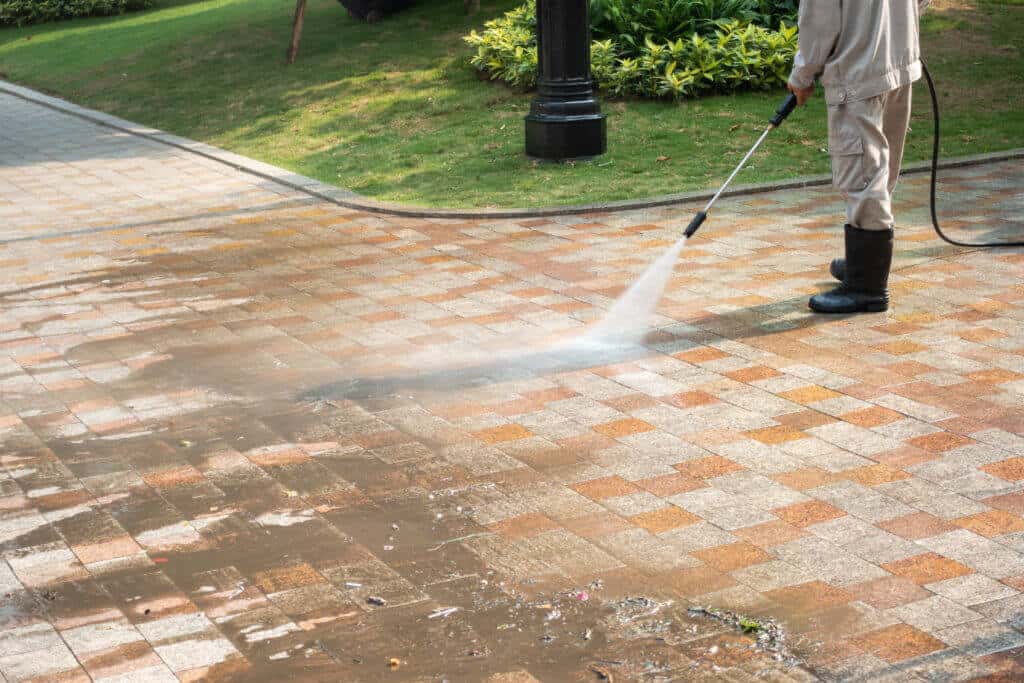
Factors Affecting Pressure Washing Time
Surface Material
Adapting pressure levels and cleaning techniques according to the specific material characteristics is crucial, influencing the duration required for thorough cleaning. Softer materials may demand gentler approaches to prevent damage, potentially extending the cleaning process, while more complex surfaces might tolerate higher pressure levels, potentially reducing cleaning time.
Size and Complexity of the Driveway
Larger and intricately designed driveways impose greater demands on the cleaning process, requiring additional time and effort to ensure thorough cleaning. The expansive surface area necessitates meticulous attention to detail to address every nook and cranny, while intricate designs can complicate the removal of dirt and grime. Consequently, dedicating sufficient time and employing effective cleaning techniques are essential to achieve optimal cleanliness and restore the driveway’s aesthetic appeal.
Level of Stains and Dirt
Surfaces heavily soiled with dirt, grime, or stains often require extended cleaning durations due to the increased effort and thoroughness needed to achieve satisfactory results. The presence of stubborn debris or deep-seated stains necessitates additional time for effective removal, as multiple cleaning passes and specialized treatments may be required. In such cases, meticulous attention to detail and the use of appropriate cleaning techniques are essential to ensure a thorough cleaning process.
Equipment Efficiency
Investing in high-quality pressure washers and compatible attachments can significantly streamline the cleaning process by delivering powerful and targeted streams of water to dislodge dirt and grime effectively. These advanced tools provide increased efficiency and coverage, reducing the time required to achieve thorough cleaning results. With the ability to adjust pressure levels and choose suitable attachments for specific surfaces, users can optimize cleaning effectiveness, ultimately expediting the overall cleaning process.
Time Estimates for Pressure Washing
Small Driveways
Generally, the process of thorough cleaning typically requires approximately 1 to 2 hours, with efficiency influenced by factors like surface complexity, dirt accumulation, and cleaning methodology. For more straightforward surfaces with minimal dirt or stains, the cleaning process tends to be quicker, often falling within the lower end of the time range. Conversely, more intricate surfaces or heavier soiling may demand additional time and attention, extending the cleaning duration towards the upper limit of the range to ensure a satisfactory level of cleanliness.
Medium-Sized Driveways
The duration for comprehensive cleaning can vary between 2 to 4 hours, contingent upon several factors, such as the complexity of the surface, the extent of dirt and stains present, and the efficiency of cleaning tools and products used. More straightforward surfaces or less severe conditions may necessitate a shorter cleaning time, while intricate patterns or stubborn stains could extend the duration toward the upper end of the range. Flexibility and adaptability in cleaning techniques are essential to ensure thoroughness within the given timeframe.
Large Driveways
In cases where elaborate patterns or multiple levels are present, comprehensive cleaning may demand a significantly more extended timeframe, often ranging from 4 to 6 hours or even more. The intricate details of these surfaces necessitate meticulous attention and thorough cleaning techniques, extending the overall cleaning duration. Factors such as the size of the area, the type of surface, and the severity of the dirt and stains can further contribute to the extended cleaning time required to achieve optimal results.
Complex Driveway Designs
Elaborate patterns or multiple levels in a cleaning surface can complicate the process by providing more nooks and crannies for dirt and grime to hide. This complexity increases the time required to ensure thorough cleaning as each intricate detail requires attention to prevent any residue buildup. Consequently, meticulous care and additional time may be necessary to achieve a satisfactory level of cleanliness, particularly in areas with elaborate patterns or multiple levels.
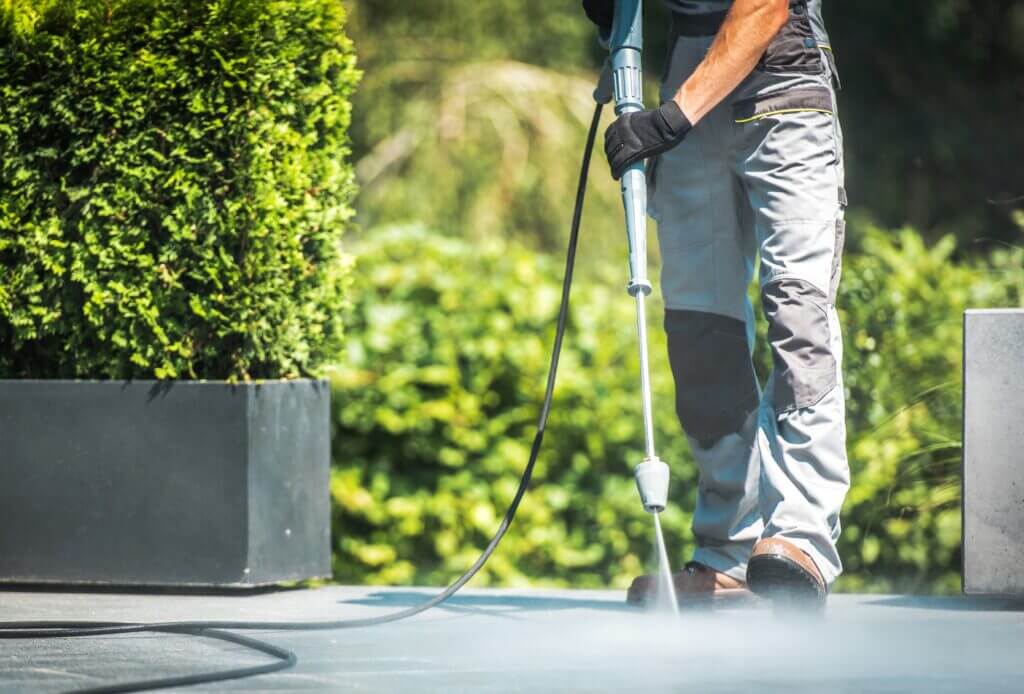
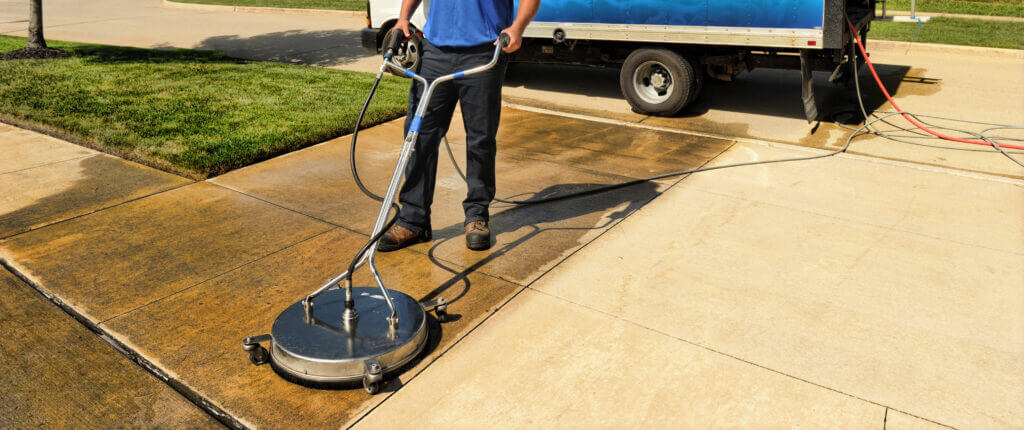
Best Practices for Efficient Pressure Washing
Preparing the Driveway
Clearing debris is crucial as it ensures a clean surface for the detergent to work effectively. Applying detergent is the next step, helping to break down grime and dirt for easier removal. Finally, soaking stubborn stains beforehand can significantly enhance their removal by allowing the detergent to penetrate deeply into the fabric or surface, loosening the stains’ grip for more efficient cleaning.
Using the Right Equipment
Selecting the proper nozzles, detergents, and pressure settings is essential for efficient and effective cleaning tasks. Nozzles should be chosen based on the desired spray pattern and intensity. Detergents should be compatible with the surface being cleaned to maximize efficacy while minimizing damage. Pressure settings should be adjusted according to the surface’s sensitivity and the level of dirt or grime present. By carefully considering these factors, users can optimize their cleaning equipment for superior results and avoid potential damage or inefficiency.
Employing Proper Techniques
Utilizing consistent, overlapping strokes is crucial for achieving smooth and even coverage, whether painting a wall or applying makeup. This technique ensures that no patches are missed and helps to blend colors seamlessly. Additionally, maintaining a safe distance while executing these strokes prevents accidental smudging or uneven application, resulting in a polished and professional finish.
Pressure washing the driveway.
Pressure washing the driveway involves the systematic application of pressurized water to cleanse the surface effectively. Utilizing a controlled water spray efficiently removes dirt, grime, and other debris from the driveway’s surface. The systematic approach ensures thorough cleaning, restoring the driveway’s appearance and enhancing its overall appeal.
Rinsing and finishing touches
Rinsing the driveway involves using water to remove any remaining debris or cleaning solution residues, ensuring a clean surface. This step is crucial to prevent any leftover stains or spots from setting in and detracting from the appearance of the driveway. Additionally, addressing any lingering stains or spots during the finishing touches enhances the overall aesthetic appeal and prolongs the cleanliness of the driveway.
Common Mistakes to Avoid
Underestimating Time
When insufficient time is allocated for cleaning tasks, individuals may feel pressured to rush through the process, leading to oversight and neglect of specific areas. This rush often results in incomplete cleaning, leaving behind dirt, grime, and potential health hazards. Inadequate time allocation undermines the effectiveness of cleaning efforts, compromising hygiene and potentially causing dissatisfaction or even safety issues.
Neglecting Safety Measures
Neglecting to wear appropriate protective gear increases the risk of sustaining injuries or encountering hazards while operating machinery or engaging in potentially dangerous tasks. Mishandling equipment, such as failing to follow safety protocols or improperly using tools, heightens the likelihood of accidents occurring in the workplace or during recreational activities. These lapses in safety practices not only endanger individuals but also pose potential liabilities for organizations, emphasizing the critical importance of adhering to safety guidelines and procedures at all times.
Using Incorrect Cleaning Agents
Using harsh chemicals or improper solutions can lead to irreversible damage to various surfaces, such as countertops, floors, and furniture. These chemicals may cause discoloration, corrosion, or degradation of the surface material, compromising its appearance and structural integrity. It is essential to follow manufacturer recommendations and use appropriate cleaning agents to ensure the longevity and quality of surfaces.
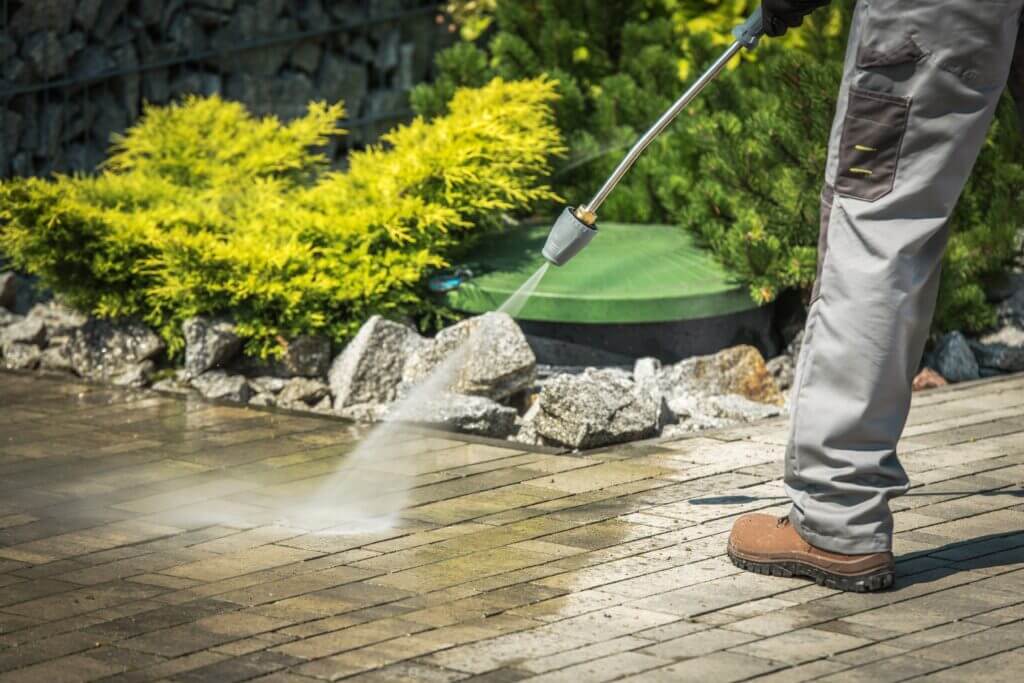
Tips for efficient pressure washing
Choose the right equipment and settings.
Choosing the appropriate equipment and settings for cleaning depends on the surface type and cleaning requirements. For delicate surfaces such as hardwood floors or glass, a soft-bristled brush attachment on a vacuum or a microfiber cloth with a gentle cleaning solution may be suitable.
For stricter surfaces like tile or concrete floors, a higher-powered vacuum with adjustable suction settings or a mop with a more robust cleaning solution may be necessary to remove dirt and grime effectively. Understanding the surface type and adjusting equipment settings accordingly ensures thorough cleaning without causing damage.
Work systematically
To effectively clean a driveway, it’s best to approach the task systematically by dividing the area into smaller, manageable sections. By tackling one section at a time, you can ensure thorough cleaning without feeling overwhelmed by the size of the task. This method allows for a more efficient and organized approach to driveway maintenance, leading to better results in less time.
Use appropriate cleaning solutions.
For removing grease stains from surfaces such as countertops or stovetops, a solution of dish soap and warm water can be highly effective. Mix a few drops of dish soap into warm water, apply it to the affected area, and scrub with a sponge or cloth to lift the grease. To remove stubborn mineral deposits like those found on showerheads or faucets, a mixture of equal parts white vinegar and water can dissolve the minerals effectively. Soak a cloth or paper towel in the vinegar solution, wrap it around the affected area, and let it sit for a few hours before wiping it clean.
Safety precautions
Adhering to safety precautions, such as wearing appropriate protective gear like helmets, gloves, and safety goggles, is crucial to preventing injuries and property damage. Additionally, it’s essential to exercise caution around electrical sources to avoid potential electrocution or fires. By implementing these measures, individuals can significantly reduce the risk of harm to themselves and their surroundings, ensuring a safer work or living environment.
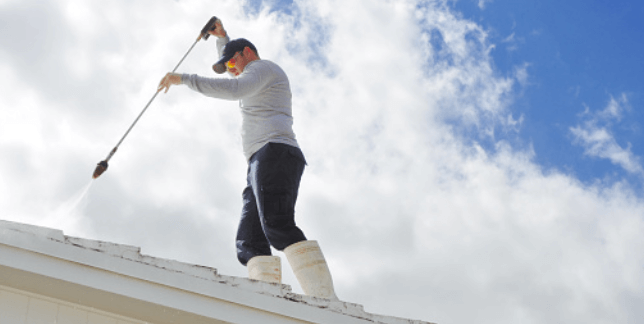
FAQs (Frequently Asked Questions)
What Is the Average Time for Pressure Washing a Driveway?
The average time for pressure washing a driveway ranges from 1 to 6 hours, depending on factors such as the size and condition of the driveway.
Can I Pressure Wash My Driveway Myself?
Yes, homeowners can pressure wash their driveways themselves, but it’s essential to follow safety guidelines, use proper equipment, and be cautious of potential hazards.
What Equipment Do I Need for Pressure Washing?
To pressure wash a driveway, you’ll need a pressure washer, appropriate nozzles, detergent formulated for outdoor surfaces, safety gear like goggles and gloves, and possibly a surface cleaner attachment for larger areas.
How Often Should I Pressure Wash My Driveway?
It’s generally recommended that you pressure wash your driveway at least once a year to prevent the buildup of dirt, grime, and other contaminants and maintain its appearance and structural integrity.
Can Pressure Washing Damage My Driveway?
When done incorrectly, pressure washing can damage your driveway. Using too much pressure or harsh chemicals can erode surfaces and cause cracks or discoloration. Therefore, it’s crucial to use proper techniques and equipment.
Should I hire a professional to do pressure washing?
Hiring a professional pressure washing service may be beneficial for homeowners who lack the time, equipment, or expertise to clean their driveways effectively. Professionals can ensure thorough and safe cleaning, especially for complex or extensive cleaning tasks.
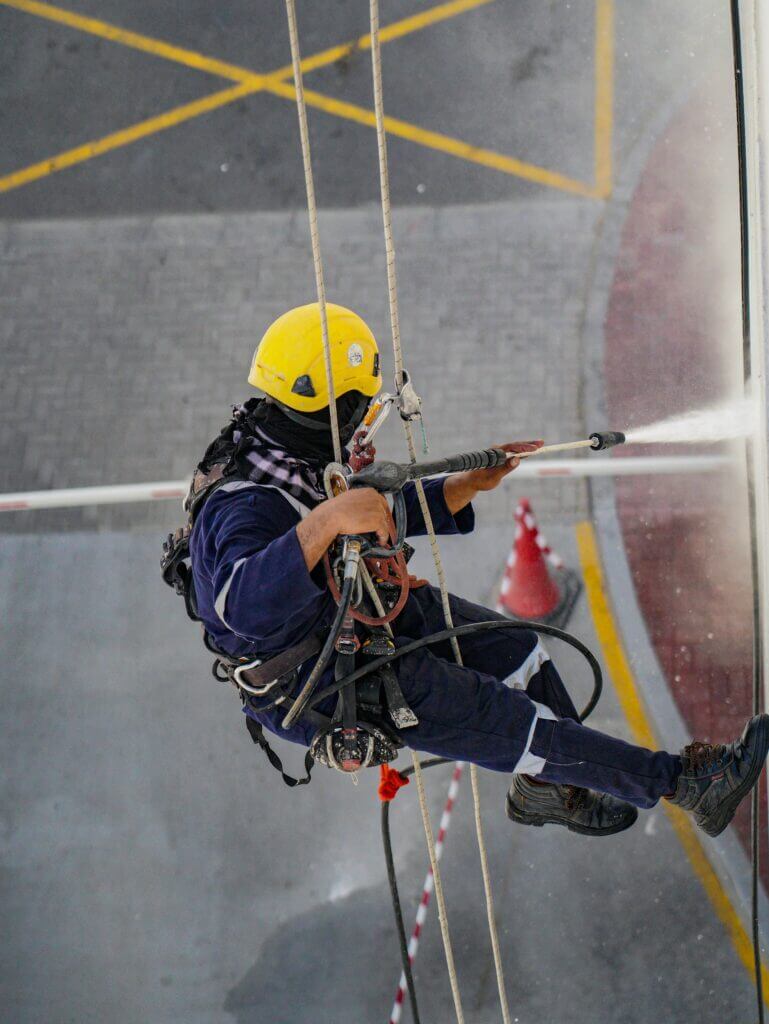
Expert Tips for DIY House Washing Safely and Effectively
Taking on a house washing project can be rewarding, and with the right approach, you can achieve that sparkling home exterior. If you’re rolling up your sleeves for some residential pressure washing action in Jacksonville, here are essential tips and tricks to ensure safety and effectiveness:
- Selecting the Correct Nozzle: Pressure washers come with various nozzle attachments designed for different tasks. Use a wider angle nozzle (such as 25 or 40 degrees) for general washing as it disperses water over a larger area, reducing the risk of damage.
- Test on a Small Area: Before going full throttle, test your chosen cleaning solution on an inconspicuous part of the surface. This helps ensure that the detergent won’t harm your home’s exterior.
- Bottom to Top: Avoid streaks by washing from the bottom up, then rinsing from the top down. This method ensures that cleaning solutions don’t drip over dry areas, which could cause unsightly marks.
- Consistent Movement: Keep the nozzle moving at a steady pace to prevent concentrated water pressure from damaging surfaces. Consistent motion contributes to an even clean without leaving marks.
- Personal Protective Equipment (PPE): Safety goggles, gloves, and ear protection are non-negotiable when operating pressure washers. Protect yourself from high-pressure water streams and debris.
- Secure Ladder Use: If your house washing project requires height, always have a spotter when using ladders. Ensure that ladders are stable and secure before climbing to prevent falls.
By following these expert house washing tips and tricks, you’ll be well-equipped to tackle your DIY projects safely and achieve results you can be proud of in Jacksonville. Remember, taking preventive measures not only ensures personal safety but also protects your property from accidental damage during the cleaning process.
Conclusion
Understanding how long does it take to pressure wash a driveway is crucial for homeowners looking to maintain their property’s aesthetic appeal, longevity, and safety. By recognizing the factors affecting pressure washing time and adhering to best practices, individuals can effectively uphold their driveway’s integrity. Whether opting for DIY maintenance or professional services, consistent upkeep remains essential for ensuring a clean and inviting entrance to your home.
Remember: A clean house is a happy house!
